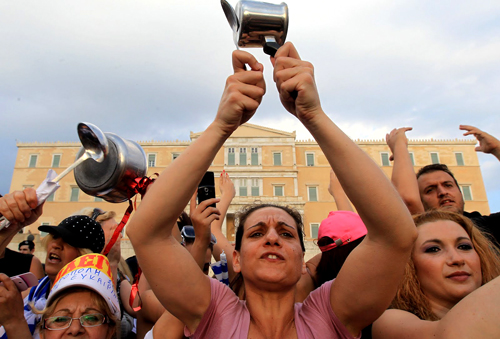
The resignation of Greek Prime Minister George Papandreou on 9 November was stark proof that it is European capital, not bourgeois democracy, that holds sway in the eurozone.
Greece needed an 8 billion euro installment from its 110 billion euro bailout agreed in May 2010, without which the country will default before Christmas. The government was also negotiating a second bailout worth 130 billion euros which would allow banks and other private holders of Greek bonds to write off 50 percent of their Greek debt. However, such bailouts involve massive austerity measures, including huge cuts in welfare, such as a overhaul of the state pension system as well as cuts in health, housing and education.
A silent coup
Following a meeting with Angel Merkel and Nicolas Sarkozy, Papandreou had secured the likelihood of the second bailout. In a moment of euphoria he announced that he would take the decision to the Greek people in the form of a referendum. He calculated that he could win such a vote, thereby securing both the deal and his own political future. It was a poor judgment. Even many of his own PASOK social democrats abandoned him, like rats deserting a sinking ship. The Greek people who have protested tirelessly against such austerity measures weren’t about to vote them into existence, and a failed referendum would have meant Greece’s immediate default. The German and French governments simply would not permit the eurozone to be recklessly endangered in this way. With phone calls to Antonis Samaras, the opposition New Democracy leader, as well as to cabinet members in PASOK a silent coup was executed. Despite retracting his promise of a referendum it was clear that Papandreou had overstepped his mandate and was duly dispatched. His replacement is former European Central Bank vice-president (and former Goldman Sachs banker) Lucas Papademos– an unelected placeman for European capital.
With Papademos in place and both bourgeois parties brought into the political process the EU is now more confident in asserting its demands. Merkel insisted on 23 November that Greece can only receive its next vital batch of bailout loans if Greek coalition parties commit in writing to a separate international aid package, ensuring support for the painful austerity measures tied to the money. She said ‘The Greek question is still unresolved because we do not yet have the preconditions to pay out the next instalment.’ The new interim government will ensure those preconditions are put into place. The whole process was a testament to German efficiency and a clear example of how the Greek people were to be denied the right to dictate their own future.
The capitalist lie
As in Britain, the working class is being told that they have been living ‘beyond their means’ for the past 30 years, that hard-fought-for rights such as a pension age of 55 and employment rights make them lazy and parasitic. This is of course the capitalist lie – that capitalism is in crisis because the workers are not working hard enough. But Greek public debt is not a result of pensions or welfare expenditure but a result of the capitalist crisis. It is exacerbated by the self-assessed tax system that allows the richest 10% of Greeks to effectively avoid paying any tax at all. Small wonder that the Greek working class has contempt for the machinations of their politicians and is continuing to organise outside the bourgeois political framework. On 1 December Greek workers will hold their sixth general strike of the year in response to the increasing austerity measures and economic hardship being imposed upon them. The unemployment rate has risen to above 17% with a massive 43.5% of under 25 year-olds unable to find work. Greek public debt has risen to 360bn euros which totals 165.3 percent of GDP. This is about 31,000 euros per person.
Occupations of Syntagma Square, the central square in Athens, continue with nightly discussions on how to solve the economic and social problems. Up and down the country the unemployed youth and students are occupying buildings and demonstrating on the streets against the economic hardships. Many workers have also gone well beyond the intermittent one-day general strikes and have organised their own pickets, such as bus drivers who have refused to drive for days on end and the steelworkers in the Athens suburb of Aspropyrgos who have now been striking for over a month in support of 34 of their dismissed colleagues. The Greek protesters are chanting loud and clear ‘We didn’t cause the crisis – we wont pay for it!’. It is time to join in solidarity with those fighting back in Greece and across the whole of Europe against the cuts and the crude lies of the ruling class.
Andrew Alexander




